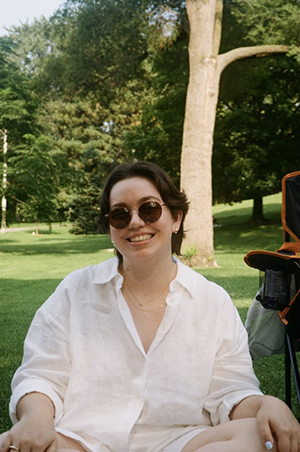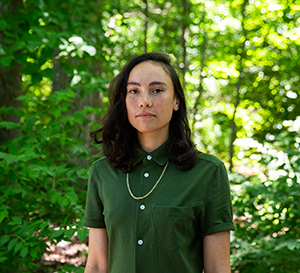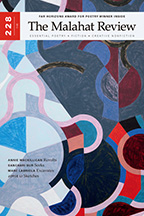Girlhood & Revolution: Em Dial interviews Annie MacKillican

Past poetry contributor Em Dial talks with Annie MacKillican, whose poem “Revolution headquarters” appears in our fall issue #228. They discuss Audre Lorde’s work, the liminal quality of the bedroom, and how a lot of young people start out on their personal liberation or abolitionist journeys at home, in their bedrooms, under cover of night.
Annie MacKillican is a writer and researcher based in Tkaronto (Toronto) and a member of the Mattawa-North Bay Algonquin First Nation. Annie’s writing has been published in Grain, Ex-Puritan, The Salterrae, and is forthcoming in PRISM International. Annie has a Master of Arts in Canadian and Indigenous Studies from Trent University, and is happy to use that degree every day working for the Friendship Centre movement and urban Indigenous communities in Ontario. When not writing, Annie can be found spending time with family and friends, reading, or learning how to figure skate. Find Annie online at anniemackillican.com or on Instagram @anniemackillican.
From the first line of this poem, “The revolution begins in my bedroom,” the reader is placed in conversation with feminist text via this play on a phrase from Cherríe Moraga and Gloria Anzaldúa’s This Bridge Called My Back: Writings by Radical Women of Color: “The revolution begins at home.” Where do you see your work building on the work of feminist thinkers like Moraga and Anzaldúa?
I’ll first say that it’s deeply humbling for my work to be in conversation with these writers—as an Indigenous poet it’s very important to me to recognize that my writing could not exist without the Indigenous women and queer writers who built a platform for me to stand on, and the Black women and writers of colour who came before them. Audre Lorde’s essay, “The Master’s Tools Will Never Dismantle the Master’s House,” which is included in This Bridge Called My Back was a fundamental piece of literature in my radicalization as a young person—it changed something in me, and so to talk about my own conceptions of girlhood and revolution in tandem with Lorde’s work is an immense privilege. Audre Lorde writes about this notion that maternity, and nurturing are the primary tools that women can use to resist the patriarchy—I think in a way, “Revolution headquarters” shows the reader a kind of microcosm of these larger structures that feminist writers have long been highlighting. When a young girl has autonomy and safety in a physical space like her bedroom, she can begin to internalize her role as part of something greater.
I listened to the Florence + the Machine song this poem is after before and after reading the body of the poem, and loved the way the lyrics transformed for me in the process, especially “If they ever let me out I’m gonna really let it out” and “When I decided to wage Holy War it looked very much like staring at my bedroom floor.” What is the significance of this song to you and your relationship to the idea of revolution?
If Florence Welch has no fans, I am dead, I’ll start with that. Girls Against God I think is one of the greatest songs ever written. The second lyric you mentioned was the impetus for this poem—I was envisioning Welch positioning patriarchal society as God and thinking about the way religion and these other oppressive systems work together to keep our communities’ most vulnerable subjugated (women, trans people, Black and Indigenous people). There’s another lyric later in the song that I had borrowed part of in an earlier version of the poem—“I know I may not look like much, just another screaming speck of dust.” When I think about how we view young girls, there’s this sort of underestimating and devaluing that takes place, and I think the consequence of that is a great deal of rage that builds up internally in these girls. Rage and underestimation are, to me, the perfect storm for something incredible. Like Welch says in the song, “Oh God you’re gonna get it, you’ll be sorry that you messed with us.”
Music is also mentioned in the second stanza of the poem. How do you see your work being affected by the music you listen to, and how does it affect the way you listen to music?
I am the kind of person who always has music playing, either out loud or just on repeat in my head. It’s kind of a natural state for me, I grew up playing piano and being in the choir and the band in school. I think music is really a second language for me. There’s a really clear connection to be made between song lyrics and poetry—when I think about the music I listen to the most, the quality of the lyricism is definitely something that stands out. Music has this incredible ability to transport you, and I find myself often getting lost in thought while listening to a song, and then coming out of it and going straight to my notebook. It’s both a mechanism for focus and also a deep and endless source of inspiration for my writing.
The bedroom is constructed in this poem as a site of protection, particularly for girls, against bedtime, against loneliness, against the danger of a pandemic, against the rules of a world as-is. It is also presented as a site of creation and imagination. What is it about the bedroom, a space which has the primary function of sleep, that makes it the revolution headquarters?
There’s something really almost liminal about the space that is the bedroom, particularly as we talk about girls or teenagers. There’s this push and pull between sleep and waking, which in my eyes brings forth this incredible space for dreaming. There’s a safety to a person’s bedroom that allows them to be experimental, to reach beyond their boundaries, whether they’re internal or in relation to the world outside their four walls. When I think about my own experiences growing up, you know, as someone who came of age in the time of the internet, there was such a great deal of growing and learning that I was only able to do in the safety of my own bedroom. I was basically radicalized on Tumblr, you know? And I won’t pretend that teenagers having unfettered access to the early internet was a perfect thing, however, it gave me the space to learn about things in a way that was new and different, and to forge my own opinions, whatever they were. Whether it was in sleep or in some half-sleep, half-wake state on the internet after dark, I could dream up a world that made sense to me. I think a lot of young people start out on their personal liberation or abolitionist journeys that way—at home, in their bedrooms, under cover of night.
Is the bedroom also your site of literary creation? Can you tell us a little bit about your writing space(s) and what you find generative about being in it?
I actually do a great deal of my writing in my bedroom, sitting in bed with my laptop. Terrible for my back, but what can you do! There’s something so safe that I’ve always felt about my bedroom, whether that be in a physical sense, or in the sense that I feel a sense of security and freedom to take risks in my work that feel uneasy in a more public space. I feel very proud of the fact that I’ve curated an incredibly cozy and restful vibe in my bedroom, and I think that sense of deep relaxation I’m able to feel allows me to be creative and generative without holding back or feeling self-conscious. I do generally feel that way about every space in my apartment, which is where I do 95% of my writing, but there’s something extra about the bedroom. Like I talked about before, there’s that facilitation of dreaming that helps give me an extra dose of imagination and creativity.
What have you been working on lately?
I’ve recently decided to actually commit to putting together a full-length poetry collection, so that’s taken up the majority of my creative energy. It’s early days, but it’s going to be very grounded in my relationships to place and the land that I’ve grown up on. I guess this is my plug to tell everyone to keep an eye out for it in like, 2030 or something, ha-ha. It’s a real challenge for me to devote all my time and energy to one project, I very much am the kind of person with twenty ideas for something large and unmanageable floating around in my head at all times, but I think it will be a good exercise in patience and perseverance for me to stick to one thing. It’s exciting though, I’m really looking forward to giving it more care.

Em Dial









